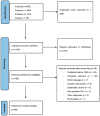Pediatric Wernicke Encephalopathy: A Systematic Review
- PMID: 39997622
- PMCID: PMC11859456
- DOI: 10.3390/pediatric17010015
Pediatric Wernicke Encephalopathy: A Systematic Review
Abstract
Background: Wernicke Encephalopathy (WE), a neurological disorder often linked to alcohol use, can also occur under non-alcoholic conditions, including in pediatric populations.
Methods: This systematic review examines 88 pediatric WE cases reported over the past 30 years, encompassing diverse etiologies such as cancer (25 cases), gastrointestinal diseases (19), malnutrition (17), psychiatric disorders (13), obesity surgery (5), renal disease (4), COVID-19 (2), PICU complications (1), hyperemesis gravidarum (1), and a genetic mutation (1).
Results: Prodromal symptoms included nausea (60%) and vomiting (55%). In total, 37% of the patients received parenteral nutrition without thiamine before WE diagnosis, often progressing to Wernicke-Korsakoff syndrome (WKS). Key findings revealed the classic triad of WKS, eye movement disorders (80%), mental status changes (75%), and ataxia (63%), with MRI demonstrating high diagnostic sensitivity (85%). Treatment varied widely; higher parenteral thiamine doses correlated with faster recovery and better outcomes, while insufficient dosages led to adverse effects. Full remission was achieved in 61% of cases, with improved outcomes in more recent reports due to refined dosing protocols.
Conclusions: These findings underscore the importance of early recognition of nausea and vomiting as predictors of pediatric WE and the critical need to incorporate thiamine in parenteral nutrition for children. Optimal dosing remains vital for recovery, particularly in severe cases.
Keywords: Korsakoff syndrome; Wernicke encephalopathy; malnutrition; parenteral nutrition; prevention; systematic review; vitamin B1.
Conflict of interest statement
The authors declare no conflicts of interest.
Figures
References
-
- Thomson A.D., Cook C.C.H., Guerrini I., Sheedy D., Harper C., Marshall E.J. Wernicke’s encephalopathy revisited. Translation of the case history section of the original manuscript by Carl Wernicke ‘Lehrbuch der Gehirnkrankheiten fur Aerzte and Studirende’ (1881) with a commentary. Alcohol Alcohol. 2008;43:174–179. doi: 10.1093/alcalc/agm144. - DOI - PubMed
Publication types
LinkOut - more resources
Full Text Sources
Miscellaneous



